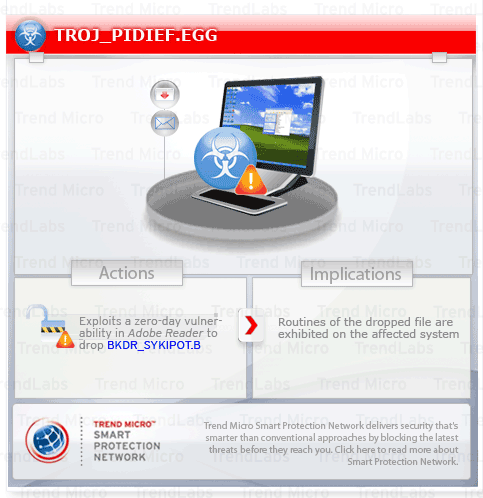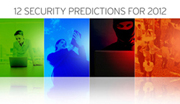TROJ_PIDIEF.EGG
Windows 2000, Windows, XP, Windows Server 2003


Threat Type: Trojan
Destructiveness: No
Encrypted: No
In the wild: Yes
OVERVIEW
This Trojan exploits a zero-day vulnerability (CVE-2011-2462) that is believed to target the defense industry.
To get a one-glance comprehensive view of the behavior of this Trojan, refer to the Threat Diagram shown below.

This is Trend Micro's detection for a specially-crafted .PDF file that exploits a vulnerability in Adobe Reader, specifically its U3D component to be able to drop and execute another malware embedded in its code.
This Trojan arrives as an attachment to email messages spammed by other malware/grayware or malicious users. It may be unknowingly downloaded by a user while visiting malicious websites.
TECHNICAL DETAILS
Arrival Details
This Trojan arrives as an attachment to email messages spammed by other malware/grayware or malicious users.
It may be unknowingly downloaded by a user while visiting malicious websites.
Installation
This Trojan drops the following files:
- %User Profile%\Local Settings\pretty.exe - detected by Trend Micro as BKDR_SYKIPOT.B
(Note: %User Profile% is the current user's profile folder, which is usually C:\Windows\Profiles\{user name} on Windows 98 and ME, C:\WINNT\Profiles\{user name} on Windows NT, and C:\Documents and Settings\{user name} on Windows 2000, XP, and Server 2003.)
Other Details
This Trojan is a zero-day exploit for the following vulnerability:
- CVE-2011-2462
NOTES:
This is Trend Micro's detection for a specially-crafted .PDF file that exploits a vulnerability in Adobe Reader, specifically its U3D component to be able to drop and execute another malware embedded in its code.
First, the malware checks the version of Adobe running in the system. It will only attempt the exploit if the version is above 9.0 and below 10.0. If successful, it drops an embedded file as follows:
- %User Temp%\ctfmon.exe
However, this is later on changed to %User Profile%\Local Settings\pretty.exe.
It then executes the said file, thus the routines of the dropped malware are also exhibited in the system. More information about this 0-day vulnerability can be found in the link below:
SOLUTION
Step 1
For Windows XP and Windows Server 2003 users, before doing any scans, please make sure you disable System Restore to allow full scanning of your computer.
Step 3
Scan your computer with your Trend Micro product to delete files detected as TROJ_PIDIEF.EGG. If the detected files have already been cleaned, deleted, or quarantined by your Trend Micro product, no further step is required. You may opt to simply delete the quarantined files. Please check this Knowledge Base page for more information.
Did this description help? Tell us how we did.



